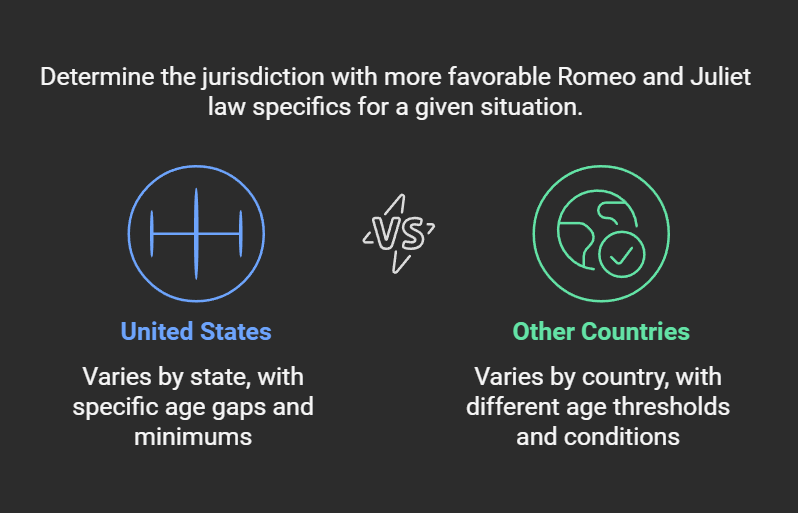
Romeo and Juliet laws are designed to address a specific legal issue related to age and consent. They provide protections for young people who engage in consensual relationships but might otherwise face serious legal consequences due to age differences. Let’s dive into what these laws are, how they work, and why they matter.
What Are Romeo and Juliet Laws?
Romeo and Juliet laws are legal provisions that aim to prevent young people from being charged as sex offenders in consensual relationships with close age differences. These laws recognize that relationships between teens and young adults are common and that harsh penalties, such as being labeled a sex offender, might not always be fair in these situations.
For example, if a 17-year-old and a 15-year-old are in a relationship and live in a state with Romeo and Juliet laws, the older teen might be shielded from prosecution or from severe charges, depending on the circumstances.

Why Are They Called Romeo and Juliet Laws?
The name comes from the tragic love story of Romeo and Juliet by William Shakespeare, where the young lovers faced societal and familial challenges due to their relationship. The term is a symbolic way of describing laws that aim to protect young people in similar situations—though thankfully, the consequences today are legal rather than life-and-death.
How Do Romeo and Juliet Laws Work?

These laws vary significantly by state or country, but they generally operate by creating exceptions to statutory rape laws. Here’s how they typically work:
- Close Age Exception:
The laws often define a specific age gap—commonly between 2 to 4 years—within which the relationship is considered legal, even if one party is below the age of consent. For instance, if the age of consent is 16, a 17-year-old might still legally date a 15-year-old if the close age exception applies. - Age Limits for Protection:
These laws don’t permit relationships with minors who are far below the age of consent. For example, an 18-year-old dating a 13-year-old would likely not be protected, even if there’s a Romeo and Juliet law in place. - Consensual Relationships Only:
Consent is a critical factor. Romeo and Juliet laws don’t apply to situations involving coercion, abuse, or force.
Where Do Romeo and Juliet Laws Apply?

The specifics of these laws vary depending on where you live. In the United States, most states have some form of Romeo and Juliet laws, but the details—like the acceptable age gap and the minimum age—differ. Some countries outside the U.S. have similar protections, but the age thresholds and conditions may be quite different.
For example:
- Texas: The law protects individuals within three years of age if one is at least 14 years old.
- Florida: The law allows a close age gap of four years for individuals as young as 16 or 17.
It’s important to understand the laws in your state or country if this applies to you.
Why Are Romeo and Juliet Laws Important?
These laws play an essential role in preventing unfair punishments. Without them, young people could face life-altering consequences, such as being placed on a sex offender registry, for engaging in consensual relationships with peers.
These protections also acknowledge the complexities of teenage relationships and offer a more compassionate legal approach.
Know more about: TruLife Distribution Lawsuit.
Common Misunderstandings About Romeo and Juliet Laws
There are some misconceptions about these laws, so let’s clear them up:
- They don’t “legalize” all teenage relationships.
The laws only protect relationships that meet specific age and consent criteria. - They don’t excuse inappropriate behavior.
If coercion, manipulation, or exploitation is involved, Romeo and Juliet laws don’t apply. - They aren’t uniform across all areas.
What’s legal in one state or country might not be legal elsewhere. Always research the local laws.
What to Do if You Need Legal Advice
If you or someone you know might be affected by these laws, it’s essential to seek guidance from a legal expert. Lawyers specializing in family or criminal law can help you understand your rights and responsibilities.
Final Thoughts
Romeo and Juliet laws are an important legal safeguard for young people. They ensure that close-in-age relationships aren’t unfairly punished while maintaining protections against exploitation and abuse.
As someone who has studied these laws, I know how vital it is to understand them fully, especially since the details can vary. Whether you’re a parent, a teen, or just someone curious about the law, I hope this post has given you a clear overview.





